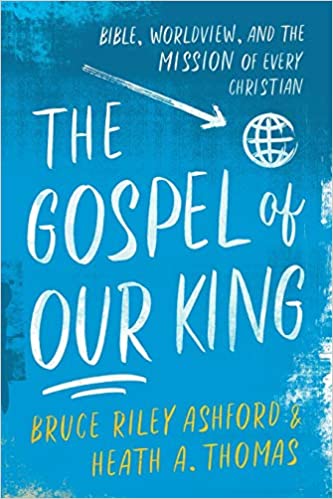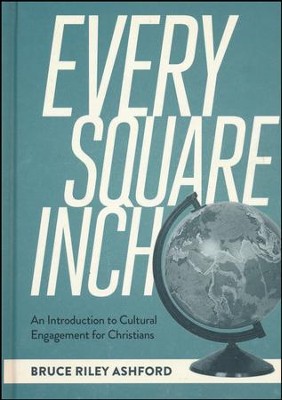Bruce Ashford is Fellow in Public Theology at the Kirby Laing Institute for Christian Ethics (Cambridge, UK), a participant in the Dulles Colloquium of the Institute on Religion & Public Life, and a trustee at the Institute for Religion & Democracy. Dr Ashford's website is BruceAshford.net and Tweets at @BruceAshford
The Storyline of the Bible & Cleaning Cats
Interview with Bruce Ashford
Loading...
https://radiopublic.com/the-laymens-lounge-GbpY7J/s1!d994e
The Laymens Lounge – I specifically wanted to talk with you in connection with a book that you and Heath Thomas just wrote called The Gospel of our King: Bible, Worldview and the Mission of Every Christian. So my first question for you is, how do you organize the Bible? That is to say, when you’re coming to the Bible, are you drawing out one pearl here and one nugget there? Or are you reading it with a certain lens and a certain framework where you position the things you read? If so, what can you give us as readers to do what you do so we could better see the big picture, because we want the forest and not just the trees?
Bruce Ashford – Yeah, it’s a good question. You know, the Bible is composed of 66 books and written by many authors and multiple genres. And sometimes it’s hard to, to sort of get a grasp of the whole, but the Bible is coherent, it fits together and one of the easiest ways to see it fit together is as a narrative: all of those books and writers come together to give us a broader, bigger story about the world – the true story of the whole world actually. And while in school, we’re often taught that our nation’s history or some sort of secular history text gives us the big story of the world, and Christianity is just a little piece of that world. In fact, the opposite is true. The Bible tells the big story, the true story of the whole world from beginning to end. And our little histories that we write are bit-players players within that narrative, and there are a lot of different ways to organize the narrative. I think the easiest over the phone is to organize it into six different plot movements:
- Creation
- Fall
- Israel
- Jesus
- Church
- New Creation
…and we could spend a little time talking about each of those at some point if you want, but that’s sort of the way we organize the first half of the book is by expanding the Bible, as a book, that gives us the true story of the whole world.
The Laymens Lounge – I always sort of viewed the Bible as the fall and then salvation that comes from Jesus. And when I say “salvation”, I meant not going to hell when I die. And the Christian life meant, essentially, sin management, and trying to snatch up as many people from hell before I die. My mind has been really expanded from what you’ve what you’ve shared in that viewing the Bible as a story, as you said, sort of that that six-piece movement. Dr Ashford, what are you seeing as far as the approach that most Americans are reading their Bible with? And how do you suggest, sort of through those six plot moves that you just said, could we address and aid us as we read our Bibles?
Bruce Ashford – Yeah, I think you’re right. A lot of times, we tend to only treat the Christian life as one of sin management – we know that there was a fall, that there is sin, and that Jesus saves us from our own sin. But we sort of lop off the other pieces of the narrative. So if I were to go through the narrative very quickly:
- The doctrine of creation teaches us that God spoke the world into existence, and then by means of His Word, He ordered the world. So that would be the kind of world that we have today, a world with plants and animals and with sky and land and water, but also the world with art and science, and politics and sports and marriage and family and church. This is the way God organized the world. Also in creation He created man and woman in his image and likeness that he told us to till the soil: that’s a cultural command, take something, make something out of the world that I made. And so not just agriculture, but other kinds of culture – He gave us a social command be fruitful multiply. In other words build families and eventually societies. And he said, have dominion lovingly manage my good world. And also we forget that very first plot movement, and it’s such an important one because it defines who we are and what we’re supposed to do, we’re supposed to till the soil and be fruitful and multiply in a way that glorifies God.
- Now, the fall happened, and in the fall, Satan spoke a word against God’s word. Remember, God had created the world by means of his Word, He had ordered it by means of His Word, and then Satan speaks a word against God’s Word, and uses a serpent to attempt Adam and Eve to sin against God, and they did. And they sought to make themselves into a god, instead of just being created in the image and likeness of God. And because they did that, they were separated from God. And they continued to be image-bearers who tilled the soil, if you will, and who are fruitful and multiply because of their sin, they do, did those things badly in a way that displease God and all of us after Adam and Eve has sinned, just like them.
- So then briefly the third plot movement: Israel. God called Israel to be a light to the nations to show the other nations what it’s like to be the people who obey God and live according to God’s will. And Israel failed miserably to do that.
- So then Jesus came forth plot movement. And He was a light to the nations perfectly in a way that Israel was not. Also crucified and rose from the dead on our behalf for the forgiveness of sins. And then when He ascended, He left behind a church and the Kingdom.
- And the fifth plot movement is church. And that is that God has called a people, Christians who gather together in local churches to declare that He is Lord – He’s called us to be a light to the nations the way to Jesus was. In other words: to shine the light of the gospel as far We can upon everyone around us and every everything around us. So Jesus behind a church and the Kingdom which brings us to…
- Our sixth and final one is new creation, or, “new heavens and earth”. And that is when Christ returns the second time he is returning to this earth, to renew it and restore it. The Bible says that there will be a purifying fire burns away sin and the consequences of sin, and that we will live together with Him and a new heavens and a new earth. And by “new”, that means renewed and restored, heavens and earth, and this is a beautiful and a powerful story. And when we lop off creation and Israel and the church and new creation, like you said, and view the Christian life as only the fall and sin management, then we lose much of the majesty of the Bible.
The Laymens Lounge – It really doesn’t become compelling when the message is truncated. It becomes compelling, when you share the way you just did, which is, essentially, you just told the story of the Bible and that you didn’t give us a “secret sauce” but just the view the Bible in its entirety. You just gave us this holistic picture and its really helpful. Now, having said that: are we currently in that that fifth scene of the church? And if so, how are we a part of that story? And more specifically, what are what is our task? What is my day-to-day task?
Bruce Ashford – Yeah, so we are in this fifth plot movement, that I’ve called the church, It’s the era before Christ returns. And what we’re called to do is to conform our life to God’s goodwill, and to give witness to Christ, through our words and our deeds, and in any sphere of culture, where the Lord Christ has placed us and there are a lot of different spheres of culture, if you will, there is:
- Art
- Science
- Sports competition
- Marriage and family and the home
- Politics and economics
- Business and entrepreneurship
- And the religious sphere
You have all these different spheres and each person’s life intersects with various areas, sectors of society or spheres of culture, and our goal is to bring glory to the Lord both in word and deed. I want to focus on word and deed for a moment. A lot of times people ask, “Well, if I’m going to give witness to the Lord – Is that through speaking about Him, or doing things on His behalf?” And you got some people that say, “listen, what really matters is speaking the gospel, but ‘doing stuff’ you can give it or take, it doesn’t really matter, do it If you want to but speaking the Gospels is the most important.” Other people would say “We got too many people speaking the gospel but not doing any loving deeds, not doing things on behalf of the gospel. And I would just say, as a general rule, Christian people should be doing both words and deeds all the time. If you remember the old in the old days, they would have covered wagons. And the wagon wheels would have a hub and then there would be spokes coming out of the hub that would be tied into a rim. And if I could make an analogy for a moment: You take this this wagon and compare it to the Christian mission. We’d say that the hub of the wheel is like the preached Gospel. The spokes in the rim are like our deeds. And you need both of those for the wheel to turn. If you ever removed the hub, which would be the preached word of the gospel, the spoken word, the wheel collapses, and the wagon doesn’t move. But if you have nothing but a hub, and there’s no spokes or rim, then the wheel doesn’t get traction, and If it does moves anywhere, it doesn’t move much at all. And so God has called us to both words and deeds so we want to always be speaking the gospel and letting people know the reason for the hope that is within us. But we also always want to be doers. Someone asked me “Which is more important”? I think they’re both important, which I mean, what’s more important for me to share the gospel with my neighbor or refrain from having sex with his wife? They both seem pretty important to me. You know, I don’t like to pick between them but people try to make us pick.
The Laymens Lounge – I have a wife who’s at home with four children and she just doesn’t have a whole lot of time and is just on the go constantly, and so she cant really “do” much, as such she, and others like her, might feel sub-Christian… If you know what I mean? They don’t feel optimal. How, for example, like even your own life – how does how does your wife Lauren feel? Like, she looks at you, and you get to do so many great and helpful things for many people, and yet, she’s home and she’s with the three kids and she’s just busy…. Does she ever feel like “I’m not being as radical as, as my husband, Bruce,” or “I’m not engaging in as much Christian activity” … How does despair not set in because we want to be a blessing and we want to be, you know, we want to “show God” that, we really genuinely care, and we want to help others. But there’s despair when we’re sort of held back by circumstances. So how does she, you know, her and other people like her themselves? Or what truth do we need to remind ourselves in those times?
Bruce Ashford – Yes, you know, our marriage are in the stages, you know, we had, and I think this is the most difficult stage often for a young woman or 20s and early 30s, it certainly was for us… My wife would say that when you’re at home, especially with the smaller kids are in diapers, but also with other kids, there is a sense sometimes in which you feel walled off from the world and from some other significant opportunities. And I think she would say a couple of things now is that those were, even though there were very difficult years, those are precious years because they are the most formative years in the formation of a child’s heart and the way a child experiences the world and even sociologists, psychologists, tell you a child’s experience early on within the home, you’re setting them up for success or for failure – and multiple different indicators I mean, medical, physical, physiological, psychological, future job success, all of that. And there is nothing more precious really than knowing that you were able to form your children. And then as life is called by the Lord has given her some opportunities to some of the kinds of things that I do. She’s actually writing curriculum for our church. She’s speaking and helping run the women’s ministry, our church. And conversely, I’ve had a lot more time at home than in the past couple of years and I’ve been learning to and really loving spending time with our children and, I’ve learned to cook…
The Laymens Lounge – O yes you have been spending some time in the kitchen! I’ve been seeing Facebook and I was like, This guy, he’s a cook and I see you’re trying to dial in some Russian, Russian
Bruce Ashford – That’s right, because I lived in Russia. But what I’ve realized is that I often am teaching, speaking or writing – but I actually love preparing a meal. Even though I’m at work all day, sometimes I feel like I’ve not accomplished anything, or not anything big, but if I can come home or prepare a meal for the family, a good one that tastes good, and nourishes, my family and they like it, that I have done something that really matters.
The Laymens Lounge – If I may say, I made a pretty glorious curry last night. I’m not gonna lie, it was wonderful. But here’s a question for you: as you were making dinner for your family – was that a “Christian activity”? Or was that morally neutral?
Bruce Ashford – Well, I mean, it depends on your intent and your heart. But I would start a general level: something as basic as the making of a meal. That’s a cultural activity. It’s something commanded by God, when God said “til the soil” He wasn’t just talking about agriculture, but every other kind of culture, including the making of meals in the home and it’s a nourishing of your children and of yourself and your spouse. But then if you’re cooking a meal, you can cook a meal to the glory of God. I mean, the Bible teaches that you can do anything you’re doing, as long as it’s not immoral, to the glory of God. And I would say cook the cooking of a meal is the one of the most important things that a person can do. God made the world to run around meals. We saw Jesus doing a lot of his disciple over meals. You see in history, many or most of the world’s great events were brokered, over a meal. Friendships are made over meals. I mean, it’s just such an important thing. And one thing the Bible teaches but that we miss and neglect is that in so many of these things that we might think are mundane, just ordinary things that we do, there’s a great possibility to honor the Lord Christ.
The Laymens Lounge – Yeah, I heard it said that “Jesus ate and drank his way through the New Testament” and that resonates with what you’re saying. Also what you said reminded me of something. And I think I saw that you actually wrote an article on your blog, which is BruceAshford.net, I think I saw you had written an article on Kanye West. And I remember I saw some late-night host interviewing Kanye West and the interviewer said “So what, are you like a Christian rapper now?” And he said, “I’m a Christian everything.” And I kind of love that he said a “Christian everything” and made me laugh out loud. And I’ve shared that a few times. So, you said cooking, I guess take it out further, is it possible to be a “Christian Everything”? Like what if Kanye isn’t rapping about Jesus, but say he’s rapping about his wife, which really loves is that a “Christian” song?
Bruce Ashford – Well, I mean, the way I would put it is that our Christianity can, and should, inform everything we do in life. And there are some people who think your Christianity really only informs your personal ethics. You know: don’t steal things, don’t sleep around your wife, don’t kill people, etc. So it informs that, and it informs their quiet times and then their church attendance. But the Bible actually gives us a picture in Psalm 119 where it says, “Your word is a lamp unto my feet, and a light unto my path.” It never says “Your word is a lamp unto my spiritual feet and my private path.” It’s your whole path, the whole path of life, that God’s Word, in creation, and God’s Word in Scripture, is relevant directly or indirectly, in one way or another to everything we do. I was teaching this in in 10 or 15 years ago in a college classroom and I had a college freshman there snickering and they were giggling and such… I said “All right, go ahead. Get it off your chest. What do want to say?” He said, “Well, is the Bible relevant to washing my cat?” So said, “Oh, that’s very funny. It’s a funny guy. And yes it is.” And so I took the funny example and said something like: how does my faith inform the way I wash my cat? Well it means that maybe it encourages me to wash my cat every once in a while and take care of it. That is God’s good creation. But it also encourages me not to wash it with more love than I would wash my baby. Because God has said, a human being is created in his image and likeness and does have a significance and a status that an animal doesn’t have. And, as I’m watching the cat, I’m going to realize that I’m not one with the cat – that’s what the Buddhists would say but we’re actually different. It’s a silly analogy, but the point is, I think that our Christianity positions everything in the world for us: teaches us how to view it, it gives us motivation to do it well and do it unto the Lord, and that counts for the mundane things.
The Laymens Lounge – That is good. That cat bit was a little bit genius. You know, I have a, a fish that somehow I got recruited to feed and clean its stinky tank, and I’m not gonna lie, don’t judge me, but some nights I lazily just don’t want to feed it. And it’ll survive, because in the past I’ve missed, but you know, I really think to myself: God created this fish. This is a “Christian” fish. You know, God created this fish. This is good, it was pronounced good. And I’m like, I don’t want to be less than awesome to this fish. So I feed it. So for me personally, I’m starting to take these things that you’re saying and, and apply them to my day to day life because I mean, really being honest, growing up, I just thought Christianity was, like we said early, essentially hell insurance. That kind of segues into my next question for you. Having three children, you have three or four, but they’re around the same age. When they say, “Dad, what is what’s the gospel?” Or “What’s Christianity all about?” Or “What are we here for?” What, what is the sort of the synopsis that you give them? Or, better yet, if they’re able to say it back to you? What do they say back to you?
Bruce Ashford – We’ll talk about the broad lens and then the narrow lens. First is that try to give them a broad land view of the gospel by teaching them Creation, Fall, Israel, Jesus, Church, New Creation – I teach them that narrative. But then I also focus on a more narrow lens, which is, what is the summary statement of the gospel? In the Bible, only three places I can think of uses the word “gospel” and then provide the definition immediately afterwards. And the place where it’s most clear is, 1 Corinthians 15:3-5, even better read verses 1-11 for context, and here’s how the gospel is described: Christ died for our sins according to the scriptures, was buried, was raised from the dead according to the scriptures, and then was seen by many witnesses. And so the very first word there – “Christ” is important because that’s a title. It is not a last name. It’s not as if Jesus would go to the waiting room at the doctor’s office and they say, “Oh, well, hello there Jesus, what’s your last name?” And he’d say, “Christ” and they’d say, “Mr. Christ go sit in the lobby.” Christ with a title. And it’s a Greek transliteration of the Hebrew title “Messiah”. And the Messiah is the kingdom-bringer, the one who ushers in the kingdom. He’s a king and a savior. He’s the king over all of creation and every sphere of culture. So that’s the first part of the gospel is the person who’s doing it, and that’s Christ.
The Laymens Lounge – Sure! He’s King over the cats and our families and our souls. Yeah.
Bruce Ashford – And so the gospel liberates us to obey Him and follow Him, and that covers every aspect of life. So Christ died for our sins, that’s the part we know very well and speak often about, and rightly should. That he took our name, which is “guilty one”, put it on himself, and got up on the cross and then He gives us his name which is “righteous one”. In exchange – if we believe on Him. So He died for our sins – is buried, that’s emphasized. In other words, He didnt not die. He was put in the ground, but He rose from the dead. When he rose from the dead, there are several things going on:
- The declaration that He really is the Messiah, He really is the kingdom-bringer and can’t be held down.
- The resurrection is a picture of what happens to our soul and spirit when we embrace Christ – that God raises our soul from the dead making is alive in Him. It’s also a preview of the fact that our bodies will be raised from the dead one day.
- And finally, that Christ will raise the cosmos from the dead. He’s going to take this heavens and earth and cleanse it of sin and all of sins consequences. So He rose from the dead.
- Finally He appeared to many witnesses. In other words, the gospel is public, and it’s something that happened in public, and its something that has continuing public relevance.
That’s a more-narrow lens presentation of the gospel.
The Laymens Lounge – I think it was NT Wright, who said something like: Its like there’s four speakers in a car, all too often we just have that one speaker turned up all the way, but the other 3 turned down and there needs to be all four of those speakers equaled out. Well, brother. Just one last question, if you don’t mind – I’m sure there is a listener right now, who is either a mom or just some Young, Restless Reformed guy, or, you know, people who are just want to be pleasing to the Lord. You know, at the end of the day, they just want to they just want the father to say “well done my good and faithful servant.” How then can we attain this? What can we do? Or what has already been done to where that we could have this sense that the Lord is, or has, spoken that over us?
Bruce Ashford – I think 1 thing I would say is, just to kind of put it the way you put it, is to remind ourselves of this truth that it is God who places us where we are now standing. Even if this is not the place we want to be standing. Even if life isn’t perfect, even if we aren’t having opportunities to make our lives as meaningful as we wish they could be the way we envision it. We remind ourselves it is God who put us here, and it is God who works in and through our efforts. And then the second is to just to remember that whatever corner of the world we’re in, that in whatever activity we’re engaging in, we can always ask three questions. And in answering those questions, we get to make a contribution.
- First question is what is God’s design for the kind of thing that I’m doing at the moment? Whether it’s caring for children, taking care of a home, writing, etc. what is God’s design – what would He want?
- Number two, how has sin corrupted and misdirected this corner of the world?
- Then number three, how can I draw upon God saving works and word to bring healing and redirection to make things right in my corner of the world?
Whether that’s coffee shop conversations, friendships, childcare, our job, our leisure, whatever it is we’re doing. Those three questions are the things that we’re supposed to be asking answering.
SUBSCRIBE TO THE PODCAST
SHARE THIS ARTICLE
Loading...
Loading...
Subscribe
0 Comments
Inline Feedbacks
View all comments
Read more in these categories
Loading...
Today we are joined by Stephen Brett Eccher to discuss the firebrand of fidelity that is Ulrich Zwingli in connection with Eccher’s new book “Zwingli the Pastor: A Life in Conflict” from Lexham Press.
This Earthly Life Matters
Was Jesus merely an “emergency measure”? Did Kuyper take the creation and culture far enough? Is the goal of life to “get saved” or is it to get saved unto the end that God intended all along? Do we overemphasize Jesus at the expense of the Trinity? All this, and...
Reviewed by Charles Ivey
How did the great Neo-Calvinist theologian Herman Bavinck view and interact with church history? Cameron Clausing’s Theology and History in the Methodology of Herman Bavinck is a weighty and vital contribution to the discussion around this question...





